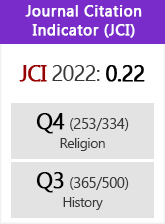The Tribal Kings in Pre-Islamic Arabia
DOI:
https://doi.org/10.3989/alqantara.1998.v19.i1.484Abstract
This article deals with the issue of tribal kings in pre-Islamic Arabia. These kings, mulūk in Arabic, were no more than tribal leaders who bore the title, malik, and placed crowns on their heads. Some of them had derived power from the Sassanid emperor who used to grant them crowns. Their scope of autority was mainly local, limited to the specific territory of their own tribes, or in some cases, was extended to include other territories by means of a federation of tribes. Supported by a garrison of horsemen from the Persian army they could impose their power over the population and territory as well. Their dominion took the form of an annual tribute extracted from the inhabitants under their control. They also acquired control over the seasonal markets held in their area, and the trade routes as well. In return, the tribal king was responsible for his tribesmen's lives and the security of their property.
Downloads
Download data is not yet available.
Downloads
Published
1998-06-30
How to Cite
‛Athamina, K. (1998). The Tribal Kings in Pre-Islamic Arabia. Al-Qanṭara, 19(1), 19. https://doi.org/10.3989/alqantara.1998.v19.i1.484
Issue
Section
Articles
License
Copyright (c) 2019 Consejo Superior de Investigaciones Científicas (CSIC)

This work is licensed under a Creative Commons Attribution 4.0 International License.
© CSIC. Manuscripts published in both the printed and online versions of this Journal are the property of Consejo Superior de Investigaciones Científicas, and quoting this source is a requirement for any partial or full reproduction.All contents of this electronic edition, except where otherwise noted, are distributed under a “Creative Commons Attribution 4.0 International” (CC BY 4.0) License. You may read here the basic information and the legal text of the license. The indication of the CC BY 4.0 License must be expressly stated in this way when necessary.
Self-archiving in repositories, personal webpages or similar, of any version other than the published by the Editor, is not allowed.














